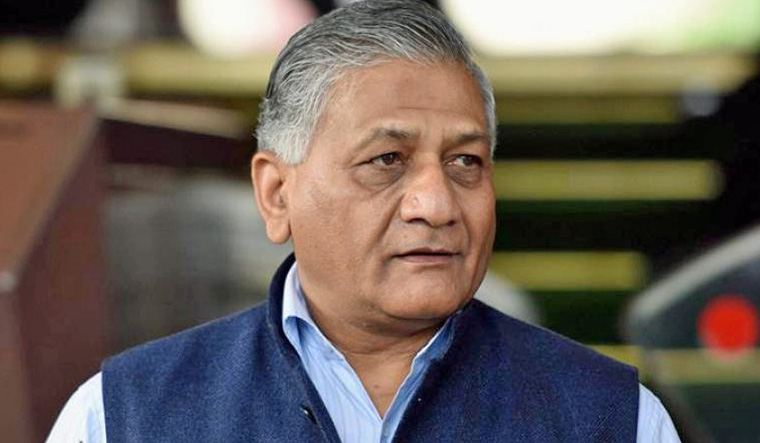Signalling a change of hearts in India's approach towards China, minister of state for external affairs General (retd) V.K. Singh said that despite the boundary dispute, both the countries can still maintain a good relationship.
Calling the year of 2018 as a landmark towards the Sino-India relation, the former Army chief said the land boundary is complex and there is a mechanism already set for it, which will carry on. "It was a conscious decision to develop the relationship in different areas and focus on people to people contacts, economics, commerce, investments in each other’s country so that it brings down those fixations and hard stances which exist," Gen Singh said on the launch of a book Sino-Indian Equation: Competition + Cooperation – Confrontation authored by Brig (Dr) Rajeev Bhutani (retd) in New Delhi.
The former Army chief also rejected the idea of a Chinese encirclement of India under the ‘String of Pearls strategy’.
“If we are friendly with Kazakhstan, Russia, japan, Laos, Vietnam, Myanmar and Tajikistan, does China call it ‘String of Pearls’? I don’t think so. Each country creates its own relationships, for its own benefits. Some of them result in good influences, some of them may not result in good influences,” General Singh said while adding that “I don’t think we are surrounded.”
Also read
The junior foreign minister's reaction seems contradictory to that of the Indian security establishment, which views China's aggressive stance by building a series of dual purpose facilities in the Indian Ocean Region (IOR), generally called as "String of Pearls", as a potential threat.
In 2017, China set-up its first off-shore base in Djibouti on the Horn of Africa, which was termed by experts as the outcome of Beijing’s “debt-trap diplomacy”. Djibouti has given longer legs to China's maritime capabilities in the Indian Ocean region.
Adopting the same approach, China gained territorial control in strategically significant places in countries like Sri Lanka, the Maldives and Pakistan.
With the aim of countering Chinese aggression in the IOR, the Indian Navy has also taken several measures to enhance its surveillance in the region. At a time, a fleet of 50 combat-ready Indian warships is carrying out round-the-clock surveillance in the region. Recently, the new airbase, INS Kohasa, was made operational in the Andaman and Nicobar territories.
Gen Singh gave credit to Prime Minister Narendra Modi for breaking the ice in the Sino-India relationship after the 73 days Doklam standoff in 2017, by calling the Wuhan Summit. He said for the first time such a summit was called without any specified agenda. "Aim of the Wuhan Summit was very simple. It was purely to achieve a personal relationship, to achieve an understanding of what each one thinks, what are the redlines, what are not the redlines, what is it that we can push and what is it that we cannot push.”
“Whether it will succeed or not, time will tell. But I think it has been a good methodology to ensure that we soften down some of the things that we keep seeing in the boundary talks,” he added.
In the recent past, sincere efforts are being taken by both India and China to improve ties. There has been an increase in the meetings between the local commanders from both sides on the Line of Actual Control, probably to prevent Doklam type situation in the future.
After Wuhan, Modi's speech at Shangri-La dialogue indicated New Delhi's changed approach towards Beijing. India has also decided to re-engage with China on maritime dialogue. Last time India held maritime dialogue with China was in 2016.
Gen Singh also said New Delhi maintains a good relationship with Iran while simultaneously having good equation with the United States and Saudi Arabia.
The book, Sino-Indian Equation: Competition + Cooperation – Confrontation, covers multiple aspects of India-China relations in the light of emerging global environment and presents the strategic initiatives, which enable India to keep its national interests uppermost.
The book talks about in detail Prime Minister Narendra Modi's efforts of diplomatic balancing not only in achieving bonhomie with President Xi but also in strengthening strategic relationships with the United States, Japan and Russia, thereby retaining India's strategic autonomy.
Speaking on the occasion, Lt General Arun K. Sahni (retd) said, "From Wuhan to Buenos Aires, the consensus built up between Prime Minister Narendra Modi and President Xi Jinping is apparently leading to calibrated cooperation between India and China that is expected to replace competition and conflict between the two countries in long term."



